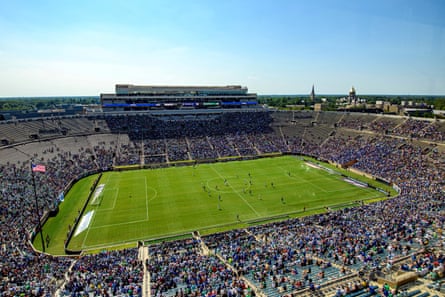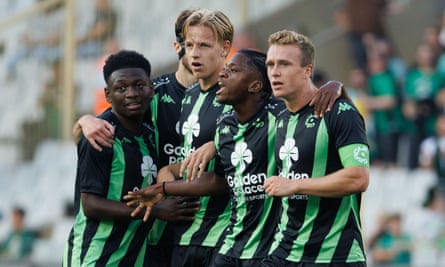It took 15 minutes of a recent in-house interview for the Rangers chairman, John Bennett, to offer the kind of triumphalism people at Ibrox should know by now to avoid. “This is a club that needs to win,” said Bennett. “That won’t change. Rangers is compelled to win.”
Bennett should brush up on his recent history. Rangers have one Premiership title since 2011. Their League Cup record in the same period is identical. They have lifted the Scottish Cup once since 2009. Rangers still exist, still function, still have tens of thousands of season-ticket holders despite winning precious little. We are living in an era of Celtic domination in Scottish football. It is strange for someone of Bennett’s intelligence to trot out this tired mantra, because it will invite inevitable pressure from restless supporters.
As Scotland’s Premiership season kicks off on Saturday, the only danger to Celtic is Celtic themselves. Rangers are a distant second best, off and on the pitch. There is no other way to assess a club who will decamp to Hampden Park for the early stages of the campaign due to the botched upgrade of disabled facilities inside Ibrox. Bennett spent the early part of the same interview trying to offer clarity on the whereabouts of three ships carrying materials to Glasgow from the far east. “Vessel No 1 has arrived,” said Bennett. “We await vessels two and three.” This was like something from a comedy sketch. Rangers are lost at sea.
They finished last season in typical form, a distant second. Their frugal approach since is sensible – Rangers have previous for damaging overspending – but will do nothing to bridge the gap. Directors have clearly decided they are unwilling to plug black holes at Ibrox. A court case rumbling on in the background, relating to retail deals and with the potential to cost Rangers millions, cannot be ignored. Renting Scotland’s national football stadium is in itself an expensive business.
Philippe Clement has admitted the scale of the necessary rebuild is greater than he anticipated when succeeding Michael Beale. It is odd that the Belgian was taken by surprise. His problem now is that he lacks the resource to oversee meaningful change and has a chairman trotting out cliches about the necessity to deliver success. Rangers’ belief in Clement – who has been on Friday was handed a contract until 2028 – is curious given the implosion from a promising title position last season. Clement is yet to show he can vary his tactical approach. Empowering him at this point is risky.

Rangers supporters begin this season with no great expectation, which is telling. The weakness of the Scottish league means a title race will exist for a while in theory, but it would be a major shock if Rangers can turn the tables when push comes to shove. Only if Clement can guide Rangers through qualifying and into the Champions League could the background dynamic change.
Celtic have money; pots of it. That is before this year’s Champions League bounty lands in their coffers. Nervousness among followers of the Scottish champions stems from the perceived unwillingness of their club to spend. This summer there will be no justification for Celtic not raising their financial bar, not with Scotland in mind but their return to the Champions League.
In terms of optics, it would be far worse for Celtic to finish bottom or close to the bottom of the Champions League in its new format. Being last of 36 looks considerably worse than toiling in a group of four. Celtic’s European record over a decent period of time is an embarrassment; a key aspiration of Brendan Rodgers when he returned last summer was surely to oversee an uplift in fortunes in a bigger pond.
Celtic therefore have no excuse for not purchasing multiple players in the £7m-£10m market, giving at least the impression they want to make headway beyond Scotland. Six years have passed since Celtic paid out their record transfer fee. Rodgers is the best manager in Scotland and presides over the best squad in Scotland; it would be a shock if he showed complacency. Rodgers requires ambition from elsewhere at the club.
after newsletter promotion

It is logical to think Aberdeen will improve under their new manager, Jimmy Thelin, despite the imminent loss of the prolific Bojan Miovski. Hibernian’s alliance with Bournemouth’s owners already appears unconvincing. Kilmarnock’s unsophisticated play under Derek McInnes was exposed again in European defeat by Cercle Brugge. St Mirren were more impressive in swatting aside Valur; the test for Stephen Robinson, who has done a fine job in Paisley, is maintaining domestic consistency. Hearts have a similar challenge when European group stage football is factored in but there will be little by way of mitigation if the Edinburgh side are not once again the best of the rest given the resources at Steven Naismith’s disposal.
Scottish football should have drawn collective breath after the national team failed so dismally at the Euros. The country is not producing anything like enough by way of emerging, first-team-ready talent to assist Steve Clarke. Instead, Scotland’s Premiership rumbles along in the same humdrum, essentially non-competitive form where overpraise is common and analysis of why standards have slipped close to nonexistent. At some stage there must be a day of reckoning.
Source: theguardian.com


















